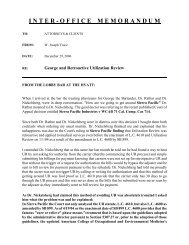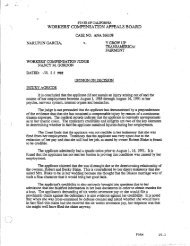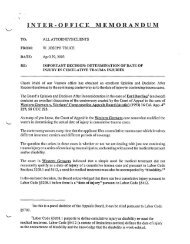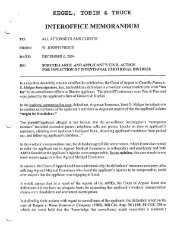George and the Surveillance Investigator - Kegel, Tobin & Truce
George and the Surveillance Investigator - Kegel, Tobin & Truce
George and the Surveillance Investigator - Kegel, Tobin & Truce
You also want an ePaper? Increase the reach of your titles
YUMPU automatically turns print PDFs into web optimized ePapers that Google loves.
ANOTHER INSTALLMENT IN THE GEORGE THE BARTENDER SERIES<br />
For past installments of <strong>the</strong> <strong>George</strong> <strong>the</strong> Bartender series, please visit our web site at<br />
http://www.kttlaw.us/memos.html<br />
RE:<br />
YOU WIN SOME, YOU LOSE SOME OR GEORGE AND THE SURVEILLANCE<br />
INVESTIGATOR<br />
FROM THE LOBBY BAR AT THE HYATT:<br />
<strong>George</strong> <strong>the</strong> Bartender had just served me my second Beefeater’s martini, straight up, with two olives<br />
when his attorney, Ron Summers, entered <strong>the</strong> lobby bar.<br />
After ordering his cocktail, Ron looked at <strong>George</strong> <strong>and</strong> said: “Well, you win some, you lose some.”<br />
Ron explained that he just concluded an all day trial at <strong>the</strong> Appeals Board in which his client was<br />
claiming that she sustained a psychiatric injury with substantial disability as a result of conflicts with<br />
her supervisors.<br />
The case had been denied on <strong>the</strong> basis that any psychiatric injury <strong>and</strong>/or disability were due to a good<br />
faith, non-discriminatory personnel action.<br />
Ron went on to explain that <strong>the</strong> good faith personnel action was predicated on a “he said, she said”<br />
conflict. The defendant brought three employer witnesses to trial, including <strong>the</strong> applicant’s manager<br />
<strong>and</strong> supervisor, to rebut <strong>the</strong> testimony of <strong>the</strong> applicant.<br />
The defendant had also obtained what Ron conceded were excellent surveillance films to rebut <strong>the</strong><br />
applicant’s claims of disability.<br />
Ron proudly told us that <strong>the</strong> Workers’ Compensation Judge, on Ron’s motion, had excluded <strong>the</strong><br />
defense witnesses from testifying at trial as <strong>the</strong> defendant had neglected to serve Ron with <strong>the</strong> recorded<br />
<strong>and</strong>/or written statements taken from <strong>the</strong>se witnesses in a timely manner.<br />
Enclosed with his appearance letter served on <strong>the</strong> defendants, along with <strong>the</strong> original Application for<br />
Adjudication of Claim was a form letter which Ron had obtained from one of <strong>the</strong> first California<br />
Applicants’ Attorneys Association seminars (CAAA) that he attended.<br />
The “form letter” that Ron referred to should be very familiar to all of us in <strong>the</strong> industry, as <strong>the</strong> letter<br />
dem<strong>and</strong>s service of all investigation reports, surveillance reports, surveillance films <strong>and</strong>, most<br />
importantly, any statements taken from witnesses or <strong>the</strong> applicant. As a matter of fact, <strong>the</strong> letter<br />
dem<strong>and</strong>s that we produce everything with <strong>the</strong> exception of our first born.<br />
We are so used to seeing this form letter that few of us pay any attention to it any more.
KEGEL, TOBIN & TRUCE<br />
RE: YOU WIN SOME, YOU LOSE SOME OR GEORGE AND THE SURVEILLANCE<br />
INVESTIGATOR<br />
June 23, 2008<br />
Page 2<br />
Applicant attorneys lovingly refer to this letter as <strong>the</strong> “Hardesty Dem<strong>and</strong> Letter.” Hardesty was <strong>the</strong><br />
first panel decision of <strong>the</strong> Appeals Board which pointed out that although <strong>the</strong> Board was not bound by<br />
<strong>the</strong> Code of Civil Procedure <strong>the</strong> workers’ compensation system m<strong>and</strong>ates full disclosure <strong>and</strong> informal<br />
discovery <strong>and</strong> that <strong>the</strong> days of “trial by ambush” were over. 1<br />
For years nei<strong>the</strong>r side (applicant or defense) utilized <strong>the</strong> Hardesty case to <strong>the</strong>ir advantage, that is, until<br />
<strong>the</strong> passage of <strong>the</strong> Margolin Reform Act in 1989.<br />
By <strong>the</strong> middle of <strong>the</strong> 1990s, workers’ compensation judges were excluding evidence not disclosed in a<br />
timely manner.<br />
In <strong>the</strong> case of City of Livingston v. WCAB (Madrid), 69 CCC 556, <strong>the</strong> Board excluded <strong>the</strong> defendant’s<br />
witnesses as <strong>the</strong> applicant had previously requested copies of witness statements which were not<br />
provided until four days before trial. 2<br />
Ron broke into my thought process by reaffirming that <strong>the</strong> trial judge in his case, over <strong>the</strong> defendant’s<br />
vehement objections, ruled that witness statements are not privileged <strong>and</strong> that <strong>the</strong> defendant’s failure to<br />
immediately produce <strong>the</strong>se statements at <strong>the</strong> request of <strong>the</strong> applicant’s attorney merited <strong>the</strong> sanction of<br />
excluding <strong>the</strong> defendant’s witnesses. 3<br />
Ron went on to boast that since all of <strong>the</strong> defense witnesses were excluded, <strong>the</strong> only witness that was<br />
allowed to testify was his client <strong>and</strong> <strong>the</strong>refore he was assured of a finding on <strong>the</strong> threshold issue of<br />
injury AOE/COE. 4<br />
1 Anyone wishing a copy of <strong>the</strong> Hardesty case should request a copy by e-mail.<br />
2 Unfortunately, <strong>the</strong> City of Livingston case referred to above is an unpublished decision of <strong>the</strong> Court of Appeal <strong>and</strong><br />
<strong>the</strong>refore it is not citable authority. However, <strong>the</strong> fact remains that <strong>the</strong> court in this particular case excluded defense<br />
witnesses as <strong>the</strong> statements of <strong>the</strong> witnesses were not timely produced <strong>and</strong> were not made available to <strong>the</strong> applicant’s<br />
attorney.<br />
3 In Moreno v. City of Los Angeles (1993), 21 CWCR 108, <strong>the</strong> Appeals Board held that witness statements are<br />
discoverable. This case involved disclosure of statements of defendant’s witnesses that were listed on <strong>the</strong> M<strong>and</strong>atory<br />
Settlement Conference Statement.<br />
4 In <strong>the</strong> case of Garden Grove Unified School District v. WCAB, Paula Cervantes, 69 CCC 280, writ denied, <strong>the</strong> Board<br />
excluded videotape evidence when <strong>the</strong> surveillance videotapes were not served by defendant until five days prior to <strong>the</strong><br />
M<strong>and</strong>atory Settlement Conference. The defendant in this case had apparently ceased temporary disability payments on<br />
<strong>the</strong> basis of <strong>the</strong> surveillance films <strong>and</strong> since <strong>the</strong> films were excluded <strong>the</strong> defendant was sanctioned by <strong>the</strong> Workers’<br />
Compensation Judge in <strong>the</strong> amount of $500.00. A full summary of this decision appears on our website under <strong>the</strong><br />
heading: “A Bad Day at Black Rock.”
KEGEL, TOBIN & TRUCE<br />
RE: YOU WIN SOME, YOU LOSE SOME OR GEORGE AND THE SURVEILLANCE<br />
INVESTIGATOR<br />
June 23, 2008<br />
Page 3<br />
As <strong>the</strong> exclusion of all of <strong>the</strong> defense witnesses basically guaranteed Ron a victory in his psychiatric<br />
stress case, I asked Ron why he was not celebrating. Ron looked at me glumly <strong>and</strong> advised that<br />
although he may have won <strong>the</strong> battle, he probably lost <strong>the</strong> war!<br />
Ron went on to tell me that <strong>the</strong> surveillance films obtained by <strong>the</strong> defendant were some of <strong>the</strong> best<br />
surveillance films that he had ever seen in a psychiatric case, as <strong>the</strong>y showed <strong>the</strong> applicant appearing at<br />
several seminars as a motivational speaker.<br />
Ron asked me if I thought that <strong>the</strong>se films might discredit <strong>the</strong> applicant’s credibility <strong>and</strong> my response<br />
was: “You think?”<br />
Ron told me he was already preparing his Petition for Reconsideration, as he felt that <strong>the</strong> surveillance<br />
films definitely should be excluded as <strong>the</strong> defendant’s surveillance investigator was unable to establish<br />
<strong>the</strong> chain of custody of <strong>the</strong> surveillance videos, which Ron asserted was an absolute foundational<br />
requirement.<br />
I was careful not to tell Ron about <strong>the</strong> legal error of his thinking until I bought ano<strong>the</strong>r cocktail for<br />
him. I <strong>the</strong>n explained to Ron that surveillance videos, like a still picture, do not require chain of<br />
custody testimony but can be au<strong>the</strong>nticated by a person who was <strong>the</strong>re (such as <strong>the</strong> surveillance<br />
investigator) <strong>and</strong> testifies that his <strong>and</strong>/or her observations of <strong>the</strong> applicant’s activities are accurately<br />
reflected in <strong>the</strong> surveillance video. 5<br />
Upon hearing this, Ron’s depression was complete <strong>and</strong> before ordering his third cocktail (a double),<br />
Ron remarked that he was sure that his depression exceeded that of his client’s.<br />
You have heard of <strong>the</strong> Age of Aquarius? We are in <strong>the</strong> Age of Full Disclosure <strong>and</strong> <strong>the</strong> days of<br />
surprising an applicant <strong>and</strong> his or her attorney by bringing in a surveillance investigator at <strong>the</strong> last<br />
moment are over. Every once in a while a defendant will be able to submit great surveillance videos as<br />
proper rebuttal evidence, but <strong>the</strong>se cases are <strong>the</strong> exception ra<strong>the</strong>r than <strong>the</strong> rule.<br />
Although full disclosure has been available for over a decade, applicants’ attorneys, thanks to <strong>the</strong><br />
knowledge that <strong>the</strong>y obtain from <strong>the</strong> CAAA conventions, have awoken to <strong>the</strong> fact that surveillance<br />
films <strong>and</strong> defense witnesses can be excluded if we are not careful to dot our i’s <strong>and</strong> cross our t’s.<br />
In a case such as Ron’s good faith personnel issue, we are put on notice almost from <strong>the</strong><br />
commencement of litigation that we will need to present testimony by our defense witnesses (usually<br />
5 In Brinks International v. WCAB (Taylor), 66 CCC 1612, writ denied, <strong>the</strong> Board held that sub rosa video tapes can be<br />
au<strong>the</strong>nticated by a percipient witness who can testify that <strong>the</strong> surveillance films accurately portray <strong>the</strong> activities of <strong>the</strong><br />
applicant which he <strong>and</strong>/or she observed.
KEGEL, TOBIN & TRUCE<br />
RE: YOU WIN SOME, YOU LOSE SOME OR GEORGE AND THE SURVEILLANCE<br />
INVESTIGATOR<br />
June 23, 2008<br />
Page 4<br />
supervisors <strong>and</strong> managers) <strong>and</strong> <strong>the</strong>refore we should develop our plan of action at <strong>the</strong> earliest possible<br />
moment so as to produce admissible evidence.<br />
For years we thought that “witness statements” are somehow protected by <strong>the</strong> attorney-client <strong>and</strong>/or<br />
work product privilege. With <strong>the</strong> exception of very specific instances, recorded <strong>and</strong>/or written<br />
statements of percipient witnesses are not privileged <strong>and</strong> are discoverable. 6<br />
Please remember that when we make <strong>the</strong> assignment to one of our AOE/COE investigation companies<br />
our investigators will probably take recorded statements unless <strong>the</strong>y are told o<strong>the</strong>rwise. In <strong>the</strong>se cases<br />
you can be sure that <strong>the</strong> applicant’s attorney will have sent his Hardesty letter (form appearance letter)<br />
requesting any <strong>and</strong> all statements of witnesses <strong>and</strong>, unless disclosed, <strong>the</strong> witnesses can be excluded<br />
from testifying at trial.<br />
THE WORK PRODUCT PRIVILEGE<br />
In Moreno, defendant State Compensation Insurance Fund (SCIF) contended that <strong>the</strong> witness<br />
statements requested by <strong>the</strong> applicant’s attorney were protected by <strong>the</strong> attorney-client privilege <strong>and</strong> <strong>the</strong><br />
work product privilege. In dismissing <strong>the</strong> arguments of <strong>the</strong> SCIF, <strong>the</strong> Board referred to a published<br />
decision by <strong>the</strong> Court of Appeal in Fellows v. Superior Court (1980) 108 Cal. App. 3rd 55, <strong>and</strong><br />
reasoned as follows:<br />
1. The attorney-client privilege applies exclusively to communications between an attorney <strong>and</strong><br />
his client <strong>and</strong> certainly does not include recorded statements of witnesses.<br />
2. The work product privilege does not apply to actual written <strong>and</strong>/or recorded statements of<br />
witnesses. The work product privilege applies when an attorney assigns an investigator to<br />
interview (not to take a written or recorded statement of) a witness <strong>and</strong> reports his<br />
impressions <strong>and</strong>/or notes of <strong>the</strong> interview back to <strong>the</strong> attorney. This is referred to as <strong>the</strong><br />
conditional work product privilege. If <strong>the</strong> attorney interviews <strong>the</strong> witness personally <strong>and</strong><br />
makes notes as to his <strong>and</strong>/or her impressions of <strong>the</strong> interview, <strong>the</strong>n <strong>the</strong>se notes <strong>and</strong> <strong>the</strong><br />
impressions of <strong>the</strong> attorney are absolutely privileged.<br />
In Ron’s case it would probably have been cost effective to have <strong>the</strong> defense attorney interview<br />
<strong>the</strong> applicant’s supervisor (at least by phone) for three reasons:<br />
First, this would negate a double interview by <strong>the</strong> investigator <strong>and</strong> <strong>the</strong> attorney who would have<br />
to interview <strong>the</strong> witness before trial anyway;<br />
6 A written <strong>and</strong>/or recorded statement taken from an owner <strong>and</strong>/or partner of <strong>the</strong> insured employer may be entitled to a<br />
claim of attorney-client privilege in certain circumstances. However, statements taken from co-employees, supervisors,<br />
management personnel, etc. are never privileged.
KEGEL, TOBIN & TRUCE<br />
RE: YOU WIN SOME, YOU LOSE SOME OR GEORGE AND THE SURVEILLANCE<br />
INVESTIGATOR<br />
June 23, 2008<br />
Page 5<br />
Second, <strong>the</strong> notes of an investigator reporting to <strong>the</strong> attorney would be subject to <strong>the</strong><br />
CONDITIONAL work product privilege <strong>and</strong> could be released to <strong>the</strong> applicant’s attorney after<br />
an en camera inspection by <strong>the</strong> Judge <strong>and</strong>;<br />
Third, <strong>the</strong> notes of <strong>the</strong> attorney conversation with <strong>the</strong> witness cannot be discovered as <strong>the</strong>se notes<br />
would have <strong>the</strong> benefit of <strong>the</strong> absolute work product. 7<br />
Disclaimer:<br />
The above legal opinions <strong>and</strong> analysis are those of <strong>the</strong> author <strong>and</strong> mine alone. My opinions were<br />
forged not only by case law but my adventures <strong>and</strong> misadventures before <strong>the</strong> Board for over 33 years.<br />
As an attachment, I am enclosing a white paper entitled BEST PRACTICES FOR<br />
SURVEILLANCE OPERATIVES AND INVESTIGATORS, which I authored at <strong>the</strong> request of one<br />
of our clients which, of course, means that I have no life.<br />
I yearn for <strong>the</strong> good old days of no disclosure, no MSC statements <strong>and</strong> trial by ambush.<br />
Make mine a double, <strong>George</strong>.<br />
Joe <strong>Truce</strong><br />
WJT/cnj<br />
7 The difference between absolute privilege <strong>and</strong> conditional privilege is that <strong>the</strong> conditional work product privilege may<br />
be subject to an en camera review by a judge who would <strong>the</strong>n decide whe<strong>the</strong>r or not <strong>the</strong> information is privileged or not.
















